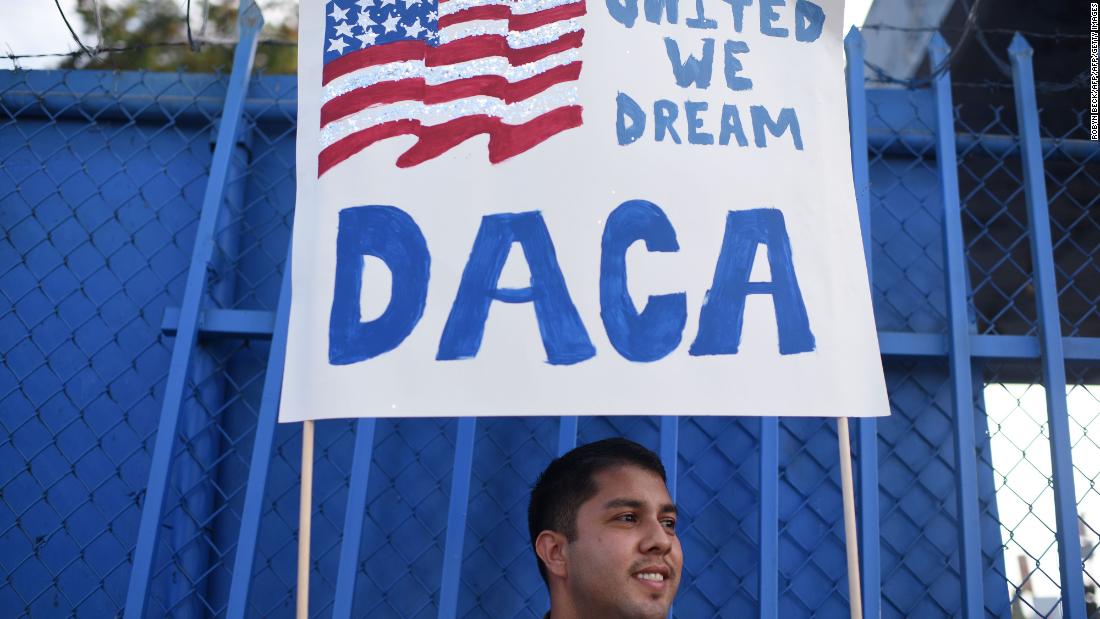
A proposal to extend protections for beneficiaries of the Obama-era Deferred Action for Childhood Arrivals program. A back and forth between Democrats and Republicans over what is and isn't acceptable in a deal. And then a fizzling out, keeping DACA recipients where they started: in limbo.
Some 700,000 undocumented immigrants have been caught in a debate over border security yet again, as President Donald Trump urges Congress to fund his signature border wall.
"In terms of seeing the program in the news all the time, it's very nerve wracking," said Claudia Flores, a DACA recipient and immigration campaign manager for the liberal Center for American Progress Action Fund. "You have Dreamers living from court decision to court decision or Trump speech to Trump speech."
The uncertainty has stalled Flores' future plans. "It prevents me from living my full potential," she said. "It's given me, on the personal front, a lot of anxiety. It's changed my ability to grow."
The DACA program, announced in 2012, shields undocumented immigrants brought to the US as children from deportation and allows them to legally work in the country. Recipients are required to renew their protections every two years. The White House tried to end the program in 2017, arguing that it was created "without proper statutory authority." Under the administration's original plan, protections would have begun to expire in March 2018. But the move was immediately met with a slew of legal challenges and subsequent court rulings that have kept the program alive.
Many DACA recipients are unable to obtain legal status on their own because they were either brought into the country illegally or they overstayed their visas. That often precludes them from becoming a lawful permanent resident because one of the requirements is having entered -- and resided in -- the country legally.
Angel Oaxaca-Rivas, a DACA recipient who resides in Denver, said that there some benefits to bringing DACA back into the spotlight in the shutdown debate.
'"I want DACA to be something that gets evaluated as a political success or program," Oaxaca-Rivas said. "On the other hand, the kind of attention it's getting is like a poker chip that gets thrown into the fold and doesn't seem to hold as much significance as I thought it should."
The Republican Senate bill slated for a vote Thursday includes protections for DACA recipients and temporary protected status holders, but only on a temporary basis. Immigrant advocates and Democrats have rejected the legislation, pushing back against what the administration cast as a good-faith effort. The bill includes some changes to DACA, like increasing fees and requiring recipients to meet minimum income requirements.
"This is not DACA. This is anything but protection," said Sanaa Abrar, advocacy director at United We Dream, the largest immigrant-youth organization in the country, in a call with reporters Tuesday. "This is actually a strategy to cut out people and deport more individuals."
The League of United Latin American Citizens (LULAC) announced in a statement that it has agreed to a meeting at the White House to discuss a possible solution. "Make no mistake about it, LULAC is there, first and foremost to demand that federal workers be allowed to get back to their jobs," said Domingo Garcia, national president of the LULAC.
"Also, we are not changing our position which we have consistently conveyed from our members and millions more Latinos. Our children and loved ones are not bargaining chips to be bartered or exchanged when a threat is being made against them."
In the meantime, the program is being held up in the courts.
The Supreme Court has not taken any action on DACA, despite the administration's requests for the court to intervene. In avoiding the case for now, the program will likely continue to live for a few more months, allowing recipients to continue to apply for renewals.
Trump's decision to include DACA in a border-wall deal is a reversal from his previous position of leaving the high court to decide on the matter. Still, it's done little to quell the concerns of recipients.
"With the courts, it's really frustrating because on one end you see courts reaffirming the way the program ended was unlawful but there hasn't been any new people in the program," Flores said. Flores enrolled in DACA in 2012 and has been allowed to renewed since.
Bagikan Berita Ini















0 Response to "DACA recipients find themselves in the middle of the border wall debate again"
Post a Comment